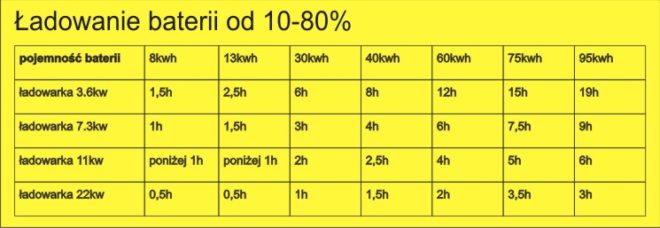How long does it take to charge an electric vehicle?
There are many factors that affect the charging time of cars. The main ones are: battery size (capacity in kWh, electric vehicles have from 28kwh up to 100kwh, hybrid plug-in vehicles from 7kwh up to 13kwh); weather conditions – the temperature and energy losses associated with it (low percentage values); AC/DC power converter charging in the car and power of external charger.
To make things simple, we assume that at home, during sleep e.g. from 9 pm till 7 am, we will be able to charge every car. As of today, it can be considered that for full-electric cars, to comfortably coexist with an EV car – you need a 7.3kw charger. For cars with a larger battery> 60-100kwh, it is recommended to use 11kw or even 22kw at home or company. Users who make long distances in one day, returning to the company for recharging should think about the 22kw charger. For users with plug-in hybrids it is enough to have 3.6kw home charger or for traveling to different places with the possibility of recharging, e.g. at friends’, in the company, in the second department, etc. a better charger will be a 7.3kw portable charger because you can charge even up to 50-60% of the hybrid capacity during 1h of parking.
Of course, when choosing a charger you also need to think about the future. As of today, the biggest batteries in vehicles have a capacity of 90-100kwh, however, the manufacturers are already talking about 20kwh capacity! So for those who are building a house, want to have a charger at the company we recommend the Wallbox 22kw.

Standard charging time – examples
The table below assumes charging from 10 to 80% because the speed of charging above 80% drops and the manufacturers recommend for the batteries to be used between 10/20-80%. Charging up to 100% can extend the charging time by up to 40%.
Examples of charging time of the most popular cars with the use of BESEN 32A 7.3kw or Wallbox 7.3kw from 10 up to 80% of the battery capacity.
Standard charging time – examples
The table below assumes charging from 10 to 80% because the speed of charging above 80% drops and the manufacturers recommend for the batteries to be used between 10/20-80%. Charging up to 100% can extend the charging time by up to 40%.
Examples of charging time of the most popular cars with the use of BESEN 32A 7.3kw or Wallbox 7.3kw from 10 up to 80% of the battery capacity.
Tesla S/X/3 75: 7,5h
Tesla S/X/3 90: 9h
Nissan Leaf I / BMW I3 33kwh: 3h
Nissan Leaf II /BMW IS 41kwh: 4h
VW E-Golf: 3h
Hyundai IONIQ Electric: 3h
Plug-in Hybrids
It takes 2h to charge most of the hybrids from the sockets because their batteries do not exceed the capacity of 10-13kwh, for example, BMW 3/5, VW Passat GTE etc.

